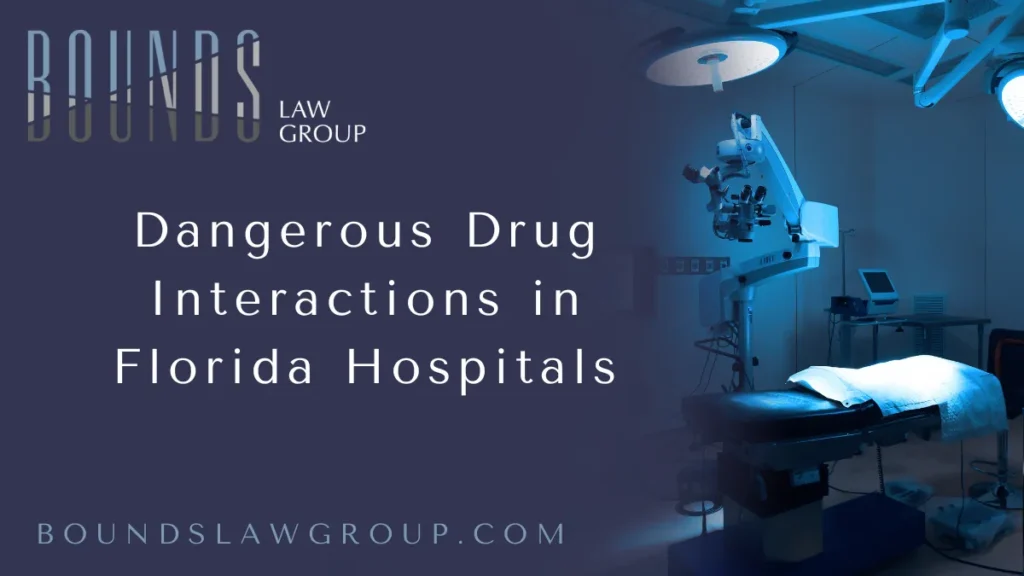
Florida Drug Interaction Malpractice Lawsuit Claims
Each year, thousands of patients in Florida hospitals suffer harm due to dangerous drug interactions—many of which could have been prevented through proper medical oversight. A Florida drug interaction malpractice lawsuit arises when a healthcare provider fails to recognize or prevent a harmful interaction between medications, leading to severe injury or even death. At Bounds Law Group, we represent victims and families devastated by these medical errors and fight relentlessly to secure the justice they deserve.
If you or a loved one suffered because of a dangerous drug interaction in a Florida hospital, it's crucial to know your legal rights and the steps to take immediately. Medical negligence involving medications is not only a breach of trust—it’s a breach of law. And our team is here to hold negligent providers accountable.
Contact us today through our free case evaluation form or call 877-644-5122.
Common Causes of Dangerous Drug Interactions in Florida Hospitals
A Florida drug interaction malpractice lawsuit typically stems from one or more of the following preventable issues:
Failure to review a patient's medication history
Physicians and pharmacists are required to assess a patient’s full medication list—including prescriptions, over-the-counter drugs, and supplements—before administering new medications.
Electronic Health Record (EHR) errors
While EHR systems are meant to reduce error, improper use, outdated software, or negligent data entry can lead to missed warnings about potential drug interactions.
Inadequate communication among healthcare providers
Hospitals rely on seamless communication between doctors, nurses, pharmacists, and specialists. When that breaks down, patients suffer.
Prescribing contraindicated medications
Medical professionals are expected to stay up to date with drug safety guidelines. Prescribing drugs that are known to interact dangerously with a patient's current regimen is a clear sign of malpractice.
Failure to monitor for adverse reactions
After administering new medications, providers must vigilantly monitor patients for signs of distress. Failing to respond to early warning signs can escalate to catastrophic outcomes.
The Role of Hospital Policies and Staff Training in Preventing Florida Drug Interaction Malpractice Lawsuits
A critical yet often overlooked factor in preventing dangerous drug interactions and subsequent Florida drug interaction malpractice lawsuits is the implementation and enforcement of robust hospital policies and ongoing staff training. Hospitals must maintain stringent protocols to ensure that all healthcare professionals are adequately equipped to identify, prevent, and respond to potential drug interactions.
Hospital Protocols for Medication Safety
Effective hospital policies include:
- Mandatory medication reconciliation processes at every stage of patient care—admission, transfer, and discharge—to ensure accuracy and continuity.
- Use of advanced drug interaction alert systems integrated into electronic prescribing software, which must be regularly updated to reflect the latest medical guidelines.
- Clear communication channels for reporting and addressing medication errors or near misses without fear of retaliation, encouraging a culture of transparency and continuous improvement.
- Standardized procedures for cross-checking prescriptions between physicians, pharmacists, and nursing staff to catch potential errors before medications reach patients.
Continuous Education and Training
Ongoing education is essential to keep hospital staff current on:
- Newly discovered drug interactions
- Changes in FDA warnings and guidelines
- Proper use of electronic health records and alert systems
- Best practices in patient communication regarding medications
Hospitals that neglect these areas increase the risk of preventable errors leading to harmful drug interactions, exposing themselves to legal liability. When hospitals fail to enforce adequate policies or provide necessary staff training, they may be held liable in a Florida drug interaction malpractice lawsuit for systemic negligence.
At Bounds Law Group, we rigorously investigate not only individual healthcare providers but also hospital policies and training programs to hold institutions accountable when their negligence causes patient harm. Knowing the hospital’s role in these tragedies is essential to building a strong case and ensuring justice for victims.

Who Is Liable in a Florida Drug Interaction Malpractice Lawsuit?
Determining liability in a Florida drug interaction malpractice lawsuit involves identifying all responsible parties. These can include:
- Physicians who negligently prescribe contraindicated medications
- Pharmacists who fail to detect or warn of known interactions
- Hospitals that fail to maintain or enforce safety protocols
- Nurses and staff who miscommunicate or administer drugs improperly
At Bounds Law Group, we conduct a full investigation to uncover every liable party and build a compelling case for full compensation.
Potential Injuries from Dangerous Drug Interactions
Drug interactions can cause a wide range of medical complications—many of them severe, permanent, or even fatal. These include:
- Internal bleeding
- Organ failure
- Cardiac arrest
- Seizures
- Coma
- Stroke
- Permanent neurological damage
- Death
Even minor drug interaction errors can result in prolonged hospital stays, permanent disability, or require lifelong medical care. Victims of these mistakes often face overwhelming medical bills, lost income, and emotional trauma. Filing a Florida drug interaction malpractice lawsuit may be the only way to obtain justice and recover financial compensation.
What Compensation Can Victims Pursue?
Victims of medical negligence due to drug interactions are entitled to pursue damages for:
- Medical expenses (current and future)
- Lost wages and loss of earning capacity
- Pain and suffering
- Emotional distress
- Loss of enjoyment of life
- Wrongful death (in fatal cases)
At Bounds Law Group, we ensure that every area of loss is thoroughly documented and aggressively pursued. Our experienced legal team collaborates with top medical experts to demonstrate the full impact of the negligence.
How to File a Florida Drug Interaction Malpractice Lawsuit
Time is of the essence when considering legal action. Florida law imposes strict statutes of limitations on medical malpractice cases. Generally, you have two years from the date you knew or should have known about the injury to file a lawsuit, but exceptions can apply.
Here’s what you need to do:
- Seek immediate medical attention for any complications.
- Document everything—including the medications involved, dates, names of providers, and all hospital records.
- Contact Bounds Law Group to schedule a legal consultation.
- Complete our free case evaluation form and let us review the facts of your case.
- Call us now at 877-644-5122 to speak with a legal professional immediately.
We will guide you through every step of the legal process with compassion, professionalism, and a relentless focus on results.

Real Case Example: Florida Patient Suffers Stroke from Drug Combination
In a recent Florida case, a 62-year-old patient suffered a massive stroke after being prescribed two medications that are clearly contraindicated in elderly patients. Despite multiple warnings in the prescribing system, the doctor failed to consult the patient’s medication history. The hospital pharmacist also failed to flag the interaction. As a result, the patient was left permanently disabled. A Florida drug interaction malpractice lawsuit filed by the patient’s family resulted in a multi-million dollar settlement.
This tragic example underscores how easily these events can happen—and how devastating the consequences can be.
Take Action Today—Speak to a Florida Drug Interaction Malpractice Attorney
You don’t have to suffer in silence after a hospital's mistake. At Bounds Law Group, we are committed to helping you fight for accountability and fair compensation.
If you or a loved one has been injured due to a dangerous drug interaction in a Florida hospital, we urge you to take immediate action. Complete our free case evaluation form or call us now at 877-644-5122 to begin your legal journey. Your consultation is 100% confidential and free of charge.
Sources
- FDA – Drug Interactions: What You Should Know
Overview of how drug interactions occur and the risks involved.
https://www.fda.gov/drugs/resources-you-drugs/drug-interactions-what-you-should-know - National Institutes of Health (NIH) – Adverse Drug Interactions in Hospital Settings
Research article detailing statistics and causes of harmful drug interactions in hospitals.
https://pubmed.ncbi.nlm.nih.gov/ - Florida Board of Medicine – Medical Malpractice Guidelines
Regulatory guidance on medical malpractice for Florida healthcare providers.
https://flboardofmedicine.gov

